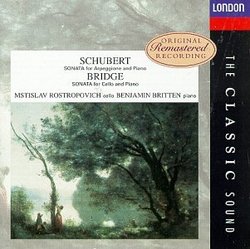Masterful playing, but beware of duplication with other reis
Discophage | France | 09/13/2006
(4 out of 5 stars)
"As Leslie Gerber indicates, this is the reissue of the LP originally published in 1968 - not very generous in timing, but an understandable editorial decision. The Schubert is a gem - both the piece and the interpretation: see my comment under the Decca Legends reissue, where it is paired with Rostropovich and Britten's 1961 recordings of Debussy's cello/piano sonata and Schumann's 5 Stücke im Volkston (Schubert, Debussy / Rostropovich, Britten).
And here lies the rub. If you also want these two recordings - the Debussy is especially worthwile, and anyway anything recorded by Rostropovich and Britten is of significance - you risk having to duplicate the Schubert, as they have not, to my knowledge, been reissued elsewhere. They were originally paired with Britten's cello/piano sonata, now aptly coupled with the composer's first two solo cello suites, performed again by Rostropovich, an indispensable disc for any Britten and/or Rostropovich admirer (Cello Suites). So the Schubert-Schumann-Debussy on Decca Legends is the one to get. What then with the Bridge sonata ? Bridge was Britten's teacher, so the latter's advocacy of his music is perhaps understandable, yet the cello sonata sounds to me like a broodingly romantic but ultiately impersonal and dull affair, and maybe one can skip it. But if - like me - you decide otherwise, there is a solution to the conundrum: Decca has reissued it in one of their "British Music Collection" (470-189-2), paired - not very generously in terms of timing (57') - with 3 tone poems recorded in 1996 by the Academy of Saint-Martin in the Fields led by Neville Marriner (originally published in a collection called English Seasons, with tone poems by Bax, Delius, Foulds and Grainger), plus a short song sung by Kathleen Ferrier. The cello sound seems more congested than on my LP, and somewhat artificially localized towards the left channel (and I assume this is the same remastering as the one in this Schubert-Bridge pairing, which was published a few years earlier). But still, this Bridge collection is the CD to get if one wants to avoid duplication. It seems available only from Amazon.uk, though.
Anyway, unless you are absolutely not interested by the Schumann and Debussy, you had better skip this one, in favour of :
- Britten sonata cello/piano with 2 cello suites
- Decca Legends Schubert-Schumann-Debussy
- Bridge British Music Collection.
"
Just fantastic
Finzi and Barber fan | 07/07/1999
(5 out of 5 stars)
"I'm not a huge classical fan and know very little about Schubert, Rostropovich or Britten. But this CD is absolutely fantastic. I prefer the Schubert piece (and bought 3 more piano CDs of his work), but both are amazing.Though 30 years old, the recording is really nice, too.I regularly check out Carnegie Hall's schedule and am disappointed that neither piece seems to be on offer.If I had any interest in carrying a cello, this CD would absolutely make me learn how to play it."
Astonishing
Finzi and Barber fan | 05/13/2007
(5 out of 5 stars)
"This CD is, quite simply, one of the finest moments of cello playing ever committed to record. Rostropovich was at the absolute peak of his technical and interpretive powers, and Britten is such a superb accompanist that one laments that he didn't record more.
The Schubert is ideally presented here: its wit and charm is caught perfectly, but both artists understand the 'laughing through tears' aspect to Schubert's music that is ever present.
This is the best recording of the Bridge Sonata - never has the astonishing emotional impact of this great work been more evident than on this recording. An a great work it is, surely one of the finest Cello Sonatas of the century. The gorgeous first movement was written in 1914 before the first world war broke out. Bridge was devastated by the war, and after it his compositions became darker and more tragic, more harmonically adventurous (culminating in the great masterpieces of his later years: the 2nd piano trio, The Oration for cello and Orchestra, Phantasm for piano and orchestra and the Piano Sonata.) The second movement of the Cello Sonata was the first hing he wrote after learning that all his friends had been killed in one night during the war. It is almost programmatic - Bridge walking around a devastated London heart broken and trying to make sense of a world gone mad. The opening Adagio of the second movement is honestly one of the most touching and haunting passages in the entire chamber repertoire. Rostropovich and Britten play like their lives depended on it - the sensitivity and empathy that they express is just heartbreaking.
Unfortunately it seems to be out of print currently, but if you ever see it available at a reasonable price, do not hesitate to buy this CD."


 Track Listings (5) - Disc #1
Track Listings (5) - Disc #1